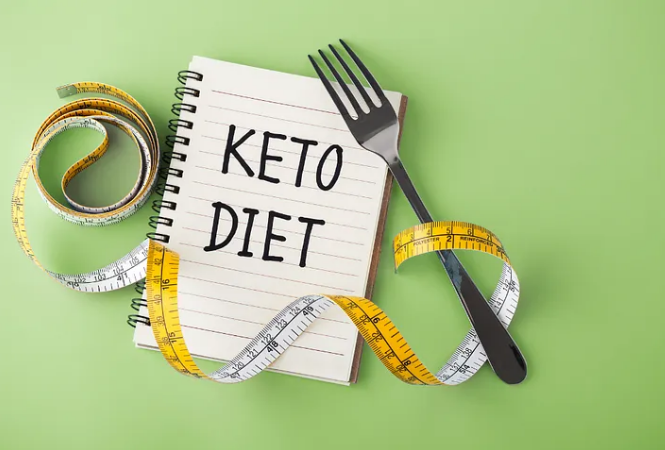Keto Diet Plan is a low-carbohydrate, high-fat diet designed to shift your body’s metabolism from burning carbohydrates to burning fats. This guide will provide you with a detailed overview of the Keto diet, including its principles, benefits, food choices, meal planning, and tips for success.
1. Understanding the Keto Diet
Principles of the Keto Diet
The Keto diet focuses on a high-fat, moderate-protein, and very low-carbohydrate intake. The typical macronutrient ratio for the Keto diet is approximately:
- 70-75% Fat
- 20-25% Protein
- 5-10% Carbohydrates
This ratio is designed to induce a state of ketosis, where the body burns fat for energy instead of carbohydrates.
What is Ketosis?
Ketosis is a metabolic state where the liver produces ketones from fat, which then become the primary source of energy for the body and brain. By drastically reducing carbohydrate intake, the body is forced to rely on fat stores for fuel, which can lead to weight loss and other health benefits.
2. Benefits of the Keto Diet
Weight Loss
The Keto diet is known for its potential to facilitate significant weight loss. By increasing fat oxidation and reducing hunger, it helps many people shed excess pounds more effectively than traditional low-fat diets.
Improved Blood Sugar Control
Lower carbohydrate intake can help stabilize blood sugar levels, making the Keto diet beneficial for individuals with type 2 diabetes or insulin resistance. By reducing the reliance on carbohydrates, blood sugar spikes and crashes are minimized.
Increased Mental Clarity
Many people on the Keto diet report enhanced cognitive function and mental clarity. Ketones are a more efficient source of energy for the brain compared to glucose, potentially improving focus and cognitive performance.
Increased Energy Levels
Fat provides a more sustained energy source than carbohydrates. On the Keto diet, many people experience stable energy levels throughout the day without the highs and lows associated with carb consumption.
3. Foods to Eat on the Keto Diet
Proteins
- Meat: Beef, pork, lamb, chicken, turkey
- Fish: Salmon, mackerel, sardines
- Eggs: Whole eggs are a versatile and nutritious source of protein.
Fats
- Healthy Oils: Olive oil, coconut oil, avocado oil
- Avocados: Rich in healthy fats and low in carbohydrates.
- Nuts and Seeds: Almonds, walnuts, chia seeds, flaxseeds
- Butter and Ghee: Useful for cooking and adding to meals for extra fat content.
Dairy
- Cheese: Cheddar, mozzarella, cream cheese
- Cream: Heavy cream can be used in cooking or added to coffee.
- Yogurt: Full-fat Greek yogurt in moderation.
Vegetables
- Leafy Greens: Spinach, kale, lettuce
- Cruciferous Vegetables: Broccoli, cauliflower, Brussels sprouts
- Others: Zucchini, bell peppers, mushrooms
Beverages
- Water: Essential for hydration.
- Tea and Coffee: Can be consumed black or with a splash of cream, but avoid sugary add-ins.
4. Foods to Avoid on the Keto Diet
Sugary Foods
- Candy: High in sugar and carbs.
- Soda: Contains large amounts of sugar.
- Pastries: Often made with high-carb flour and sugar.
Grains and Starches
- Bread: Includes all types of bread.
- Pasta: Traditional pasta is high in carbs.
- Rice: Even brown rice is not Keto-friendly.
High-Carb Fruits
- Bananas: High in carbohydrates and sugar.
- Apples: Contains too many carbs for a Keto diet.
- Oranges: High in natural sugars.
Legumes
- Beans: Includes black beans, kidney beans, and chickpeas.
- Lentils: High in carbohydrates and should be avoided.
Certain Vegetables
- Potatoes: Includes all types of potatoes.
- Sweet Potatoes: Too high in carbohydrates.
- Corn: High in sugar and starch.
5. Sample Keto Meal Plan
Breakfast
- Avocado and Egg: Scrambled eggs cooked in coconut oil with sliced avocado.
- Keto Smoothie: Blend spinach, unsweetened almond milk, avocado, and a scoop of protein powder.
Lunch
- Chicken Salad: Grilled chicken breast with mixed greens, avocado, and olive oil vinaigrette.
- Zucchini Noodles: Tossed with pesto and grilled shrimp.
Dinner
- Grilled Salmon: Served with a side of sautéed spinach and cauliflower rice.
- Beef Stir-Fry: Thinly sliced beef with bell peppers and broccoli in a low-carb sauce.
Snacks
- Cheese Sticks: A quick and satisfying snack.
- Nuts: A handful of almonds or walnuts.
- Celery with Cream Cheese: A crunchy and creamy snack option.
6. Tips for Success on the Keto Diet
Track Your Macros
Use a food diary or an app to track your fat, protein, and carbohydrate intake to ensure you stay within your Keto goals.
Stay Hydrated
Drink plenty of water to stay hydrated. The Keto diet can increase water loss, so it's essential to maintain proper hydration.
Get Enough Electrolytes
Ensure adequate intake of electrolytes such as sodium, potassium, and magnesium to avoid imbalances. Consider adding a pinch of salt to your meals or drinking electrolyte-rich beverages.
Prepare for the Keto Flu
As your body adapts to ketosis, you may experience symptoms like fatigue, headache, or irritability. This is commonly referred to as the Keto flu and typically resolves within a few days.
Plan Your Meals
Meal planning is crucial for staying on track with the Keto diet. Prepare meals in advance and keep Keto-friendly snacks on hand to avoid temptations.
Consult a Healthcare Professional
Before starting the Keto diet, especially if you have any pre-existing health conditions, consult with a healthcare provider to ensure it’s appropriate for you.
7. Potential Challenges and Considerations
Nutrient Deficiency
Due to the restrictive nature of the Keto diet, it’s important to include a variety of foods to prevent nutrient deficiencies. Consider taking a multivitamin or specific supplements if needed.
Long-Term Sustainability
Evaluate whether the Keto diet fits your long-term lifestyle and health goals. Some people may find it challenging to maintain the diet indefinitely.
Social Situations
Plan how you’ll handle social events or dining out where Keto-friendly options may be limited. Communicate your dietary needs and seek out low-carb alternatives when possible.
Conclusion
The Keto diet can be a powerful tool for achieving various health goals, from weight loss to improved mental clarity. By understanding its principles, carefully selecting foods, and planning meals, you can maximize the benefits and enjoy a successful Keto journey. Remember to consult with healthcare professionals and consider your long-term goals to ensure the diet is right for you.

